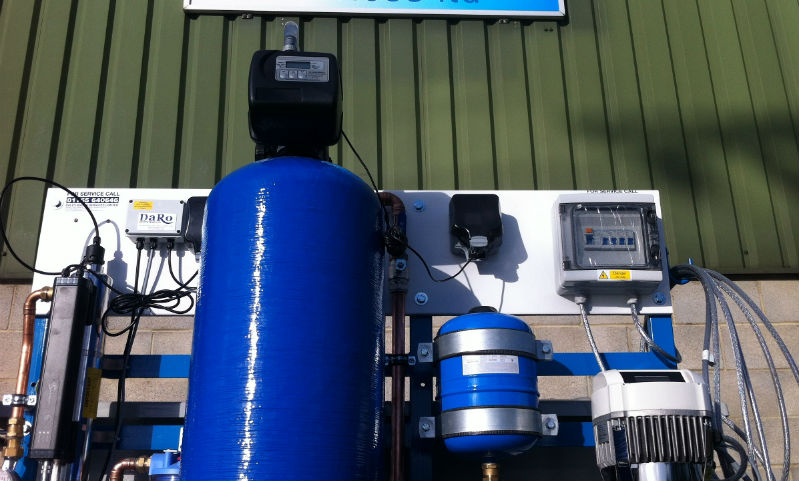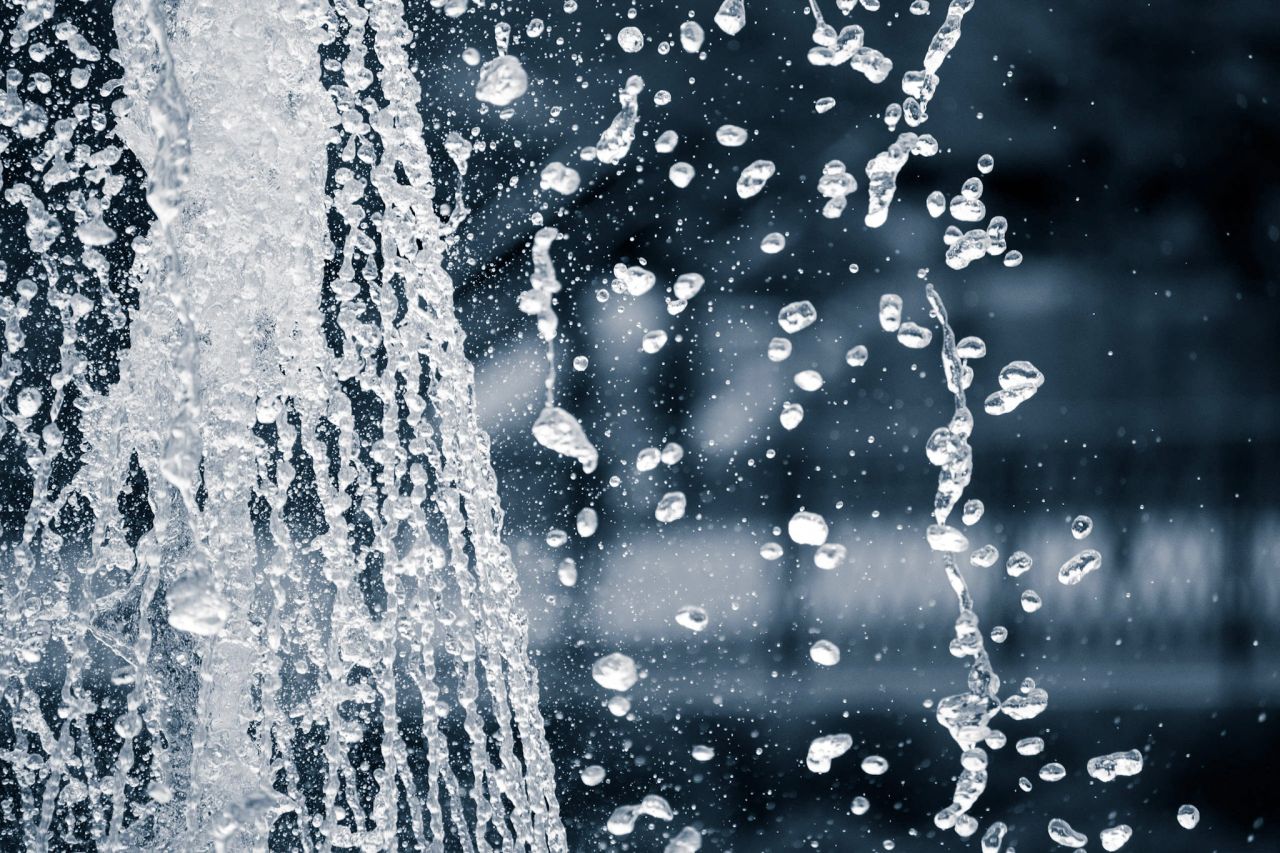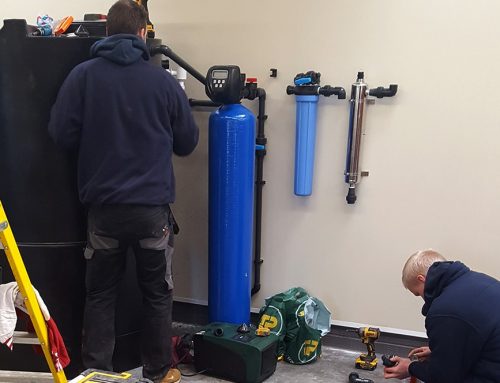As part of our full scale private water supply services Dales Water provide in-house water quality treatment / filtration requirements for a number of clients.
For certain applications water treatment may be required to bring the water in line with drinking water requirements or to make sure it’s fit for the proposed use. This is carried out for a range of problems using various techniques that we’ll cover below.
Before we look at those specific problems it’s worth noting that in many cases water treatment isn’t required and borehole / spring water is perfectly fit for purpose the minute it comes out of the ground whether it’s for domestic, industrial, commercial or agricultural use.

Pump set, water storage and ultra violet purification
Common problems that we encounter and how we solve them:
Turbidity & Colour
Turbidity is when water has a hazy or translucent look about it; this is caused by the presence of suspended particles.
It gives the water an undesirable look. Water treatment for turbidity and water colour is usually treated via filtration and is a well established and effective method, often treating for the cause of turbidity will consequently reduce the turbidity or colour as well.
Taste & Odor
The taste & odour is subjective but for those affected it makes it impossible to drink and reduces the palatability of foods cooked in the water.
The main source of odour and taste bearing substances in borehole water are caused by elevated levels of determinants and the smell is caused by elevated level of hydrogen sulphide (rotten eggs) for example.
Odour and taste problems are solved by simply eliminating the offending substance and the treatment method varies for each.
Pathogenic Organisms
A pathogenic organism is basically an organism that is capable of causing disease and illness. This can be anything from microscopic bacteria through to small viruses.
In properly constructed boreholes, like ours, the conditions for bacterial growth in groundwater should not exist, however in a poorly or incorrectly constructed borehole or, from other points in the infrastructure, e.g.: water storage, conditions for growth might be introduced which can allow bacteria to be produced.
The most common ways of eliminating bacteria is via oxidation i.e. chlorine disinfection, ozonation or via ultra violet water purification. More information on treating for bacteria can be found via some of previous blog posts about legionella in private water supplies and bacteria water supplies.
It’s important that regular bacterial analysis of the treated water is carried out to ensure that the treatment in place is working effectively.
Hardness and Alkalinity
Hardness and alkalinity of water, which is quite common, is caused by calcium and magnesium. It often requires treatment as hard water deposits scale in infrastructure, pipes, boilers, kettles and particularly when the water is heated. This reduces their capacity and heat transferring properties.
However, hard water is not a health concern and many people prefer the taste of hard water, due to it being higher in minerals like calcium but treatment is required to protect infrastructure.
Hardness can be treated through the use of water softeners which are long established and work well at reducing hardness through ion exchange.
Iron
Iron compounds, which are prevalent in rock and soil, are dissolved easily in water. Remember the earths crust is a major source of iron so consequently iron is present in a lot of groundwater supplies.
When exposed to air, iron oxidises which can cause damage to plumbing systems, pumping systems and other devices that make use of groundwater (boreholes and springs).
Large quantities of iron can cause rusty stains in infrastructure like porcelain; if elevated levels of iron are drunk in large amounts it can have health implications and if used with foods can make them unpalatable.
Iron bacteria can also cause additional problems. They may cause a rusty colour in water supplies or create a slime that clogs valves, pumping equipment and water-using appliances.
Iron can be treated through filtration.
Manganese
Iron and manganese often go hand in hand; they are both similar and require the same sort of treatment. Like iron, manganese is a naturally occurring substance in the earth’s crust meaning it’s found frequently in groundwater.
When found in larger concentrations manganese can give water a bitter and metallic taste and under the right conditions can cause health problems and if used for domestic purposes may leave deposits on food when used in cooking or stain laundry.
Just like iron, manganese can be treated filtration.
Nitrate
Nitrate can occur in groundwater through natural processes, it occurs naturally in soils but can occur because of anthropogenic human influences, such as wastewater, sludge, fertilisers and manure. Nitrate is broken down by bacteria and is available for plants to take up but in certain circumstances excessive amounts can build up which can leach in to groundwater.
Nitrate can also be converted by bacteria into nitrite which again can also leach into groundwater. Due to intensive agriculture and the application of fertilisers it is considered by some that nitrate could be a significant problem in the future.
Nitrate can also cause negative health affects such as blue baby syndrome.
Filtration is a common way to treat for nitrate.
Acidity
pH is the measure of hydrogen ion concentration. It is a logarithmic scale therefore pH 6 is ten times more acidic than pH 7.
pH in groundwater is affected by the rocks and earth that the water passes through, plant growth and decay, historical human activities such as coal mining causing ferrous oxide which is acidic plus current human activities that may pollute the water and acid precipitation that falls in the area local to the source.
Typically spring water supplies are more affected by many of these lowering their pH value making them acidic.
Low levels of pH can be corrosive to infrastructure and harmful to drink. Extremely High levels of pH, alkaline, can have negative health effects.
pH can be treated via the use of filtration raise the level of pH.
If you’re having any problems with your private water supply quality or are unsure of what type of water treatment you might need please feel free to contact us for any free, no obligation advice.



